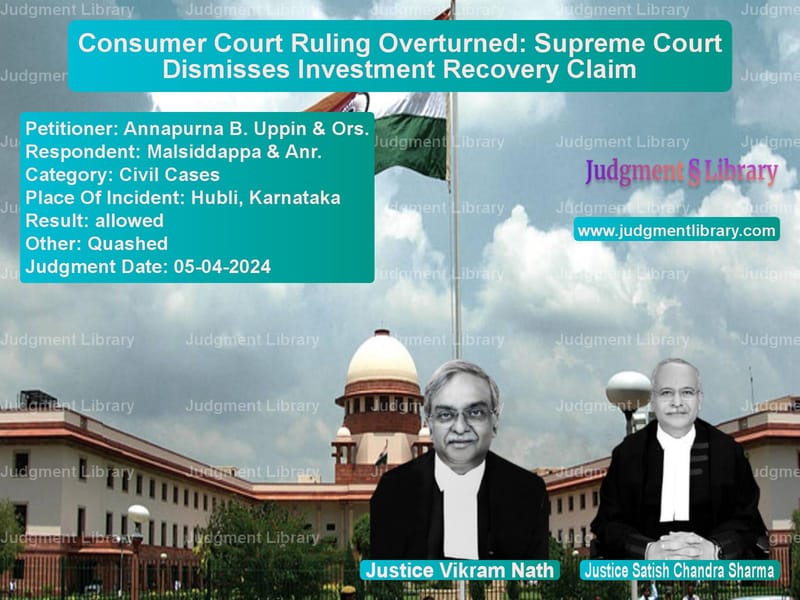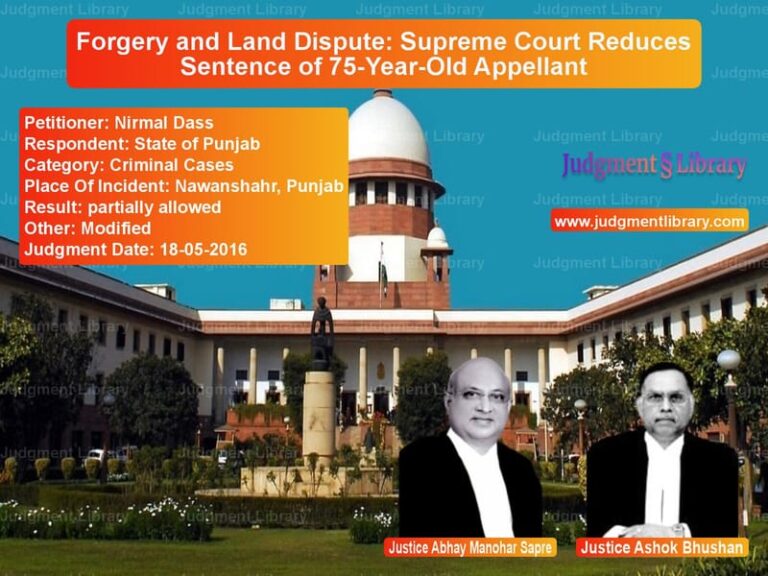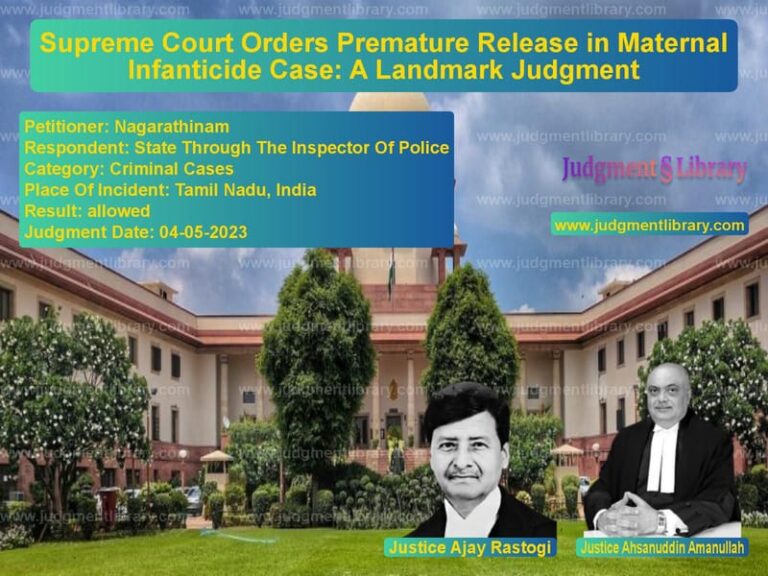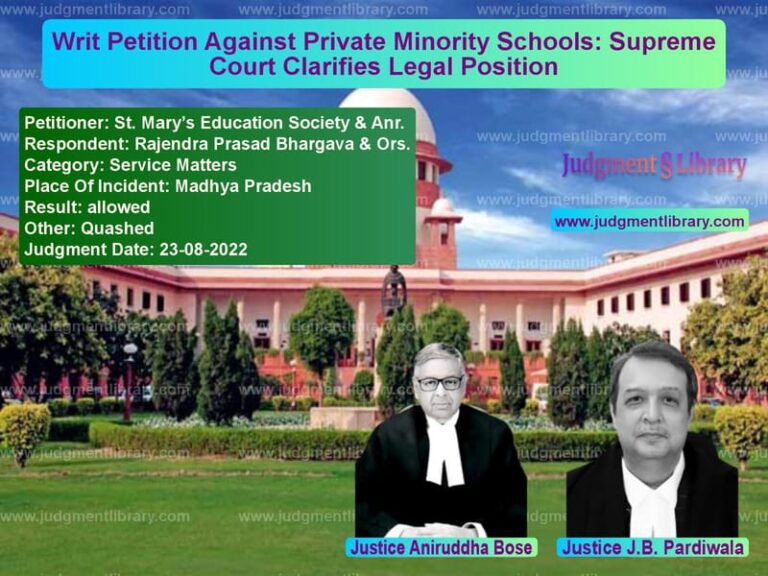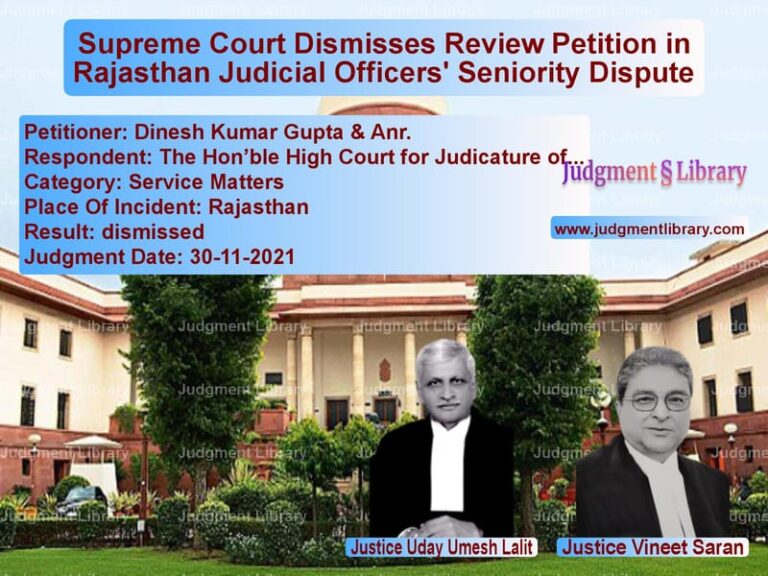Consumer Court Ruling Overturned: Supreme Court Dismisses Investment Recovery Claim
The case of Annapurna B. Uppin & Ors. vs. Malsiddappa & Anr. is a significant ruling on the maintainability of consumer complaints in financial disputes. The Supreme Court was called upon to determine whether a dispute involving a partnership investment could be adjudicated under the Consumer Protection Act, 1986, or whether it should be treated as a civil suit.
Background of the Case
The dispute originated in 2002 when Malsiddappa (respondent No.1) invested Rs.5 Lakhs in a partnership firm, M/s Annapurneshwari Cotton Co., located in Amargol, Hubli, Karnataka. The agreement stipulated that the invested amount would be repayable after 120 months with interest at 18% per annum. However, when the complainant sought pre-mature withdrawal of his investment, the firm refused, citing the agreement’s terms.
Upon reaching the maturity period, Malsiddappa again demanded repayment, but the firm failed to comply. After issuing a legal notice in 2014 and receiving no response, he filed a consumer complaint with the District Consumer Disputes Redressal Forum (DCDRF), Dharwad, alleging deficiency in service.
The primary question before the courts was whether the case fell within the purview of consumer law, as the complainant had invested money in a commercial venture with the expectation of returns.
Proceedings Before Consumer Courts
- DCDRF Ruling (2014): The consumer forum ruled in favor of Malsiddappa, directing the firm and its partners to pay Rs.5 lakhs along with 18% interest per annum from 2002 to 2012 and 6% interest thereafter until realization. Additionally, the firm was ordered to pay Rs.5,000 as compensation for mental agony and Rs.2,000 as litigation costs.
- State Commission (SCDRC) Remands Case: The firm appealed before the State Consumer Disputes Redressal Commission (SCDRC), Bangalore, which remanded the case for fresh consideration due to procedural lapses.
- DCDRF Ruling (2016): The consumer forum again ruled in favor of Malsiddappa, reiterating its previous order.
- SCDRC Reversal (2019): The case was again remanded for reconsideration, specifically to determine whether the complaint was maintainable under consumer law.
- DCDRF Final Ruling (2021): The forum reaffirmed its earlier decision, prompting the firm to appeal once more before the SCDRC, which upheld the ruling.
- National Consumer Disputes Redressal Commission (NCDRC) (2022): The firm challenged the order before the NCDRC, which dismissed their revision petition, leading to the present appeal before the Supreme Court.
Arguments by the Petitioners (Annapurna B. Uppin & Ors.)
- The complainant, Malsiddappa, was not a consumer under the Consumer Protection Act, 1986, as his investment was for commercial purposes.
- The firm was a partnership business, and disputes related to partnerships should be adjudicated in civil courts, not consumer forums.
- The complainant had previously been a partner in the firm, meaning his claim should be resolved under the Partnership Act, 1932, and not under consumer law.
- The complaint was barred by limitation, as the investment was made in 2002, but the complaint was filed in 2014.
Arguments by the Respondents (Malsiddappa)
- The complainant was not a partner at the time of filing the complaint and was merely an investor.
- The refusal to return the invested amount amounted to deficiency in service under consumer law.
- The legal heirs of the deceased managing partner should be held liable for repayment as they inherited the firm’s assets.
- The case was correctly adjudicated by the consumer forum, and the Supreme Court should not interfere.
Supreme Court’s Analysis and Judgment
The Supreme Court ruled in favor of the appellants, holding that the consumer forums lacked jurisdiction over the case. Key observations included:
- Complainant Was Not a Consumer: The Court held that Malsiddappa had invested money with the expectation of profit, which constituted a commercial transaction. Under the Consumer Protection Act, commercial transactions are outside the scope of consumer disputes.
- Partnership Disputes Belong in Civil Courts: The Supreme Court reaffirmed that partnership disputes and claims for recovery of investments in business ventures should be handled in civil courts, not consumer courts.
- Legal Heirs Not Liable: The Court found that the legal heirs of a deceased partner cannot automatically inherit liability unless they explicitly accept the partnership’s assets and liabilities.
- Consumer Forums Overstepped Jurisdiction: The ruling emphasized that consumer courts should not entertain cases involving business transactions disguised as consumer disputes.
Based on these findings, the Supreme Court concluded:
“The District Forum, the State Commission, and the National Commission fell in error in allowing the complaint and upholding it in appeal and revision.”
Supreme Court’s Final Order
- The consumer forum’s order awarding Rs.5 Lakhs with interest was quashed.
- The complaint was dismissed, and Malsiddappa was advised to pursue his claim before the appropriate civil court.
- The legal heirs of the deceased partner were not liable for the firm’s financial obligations.
Legal Implications of the Judgment
This ruling sets an important precedent regarding the jurisdiction of consumer courts. Key takeaways include:
- Commercial disputes should be resolved in civil courts, not under consumer law.
- Investments made in business ventures do not qualify for protection under the Consumer Protection Act.
- Legal heirs do not automatically inherit liabilities of a deceased partner.
Conclusion
The Supreme Court’s decision reinforces the principle that consumer courts should not entertain business disputes disguised as consumer grievances. The ruling protects businesses and individuals from being wrongly dragged into consumer litigation when the appropriate forum for resolution is a civil court. This judgment will serve as a guiding precedent in future cases involving financial investments and partnership disputes.
Petitioner Name: Annapurna B. Uppin & Ors..Respondent Name: Malsiddappa & Anr..Judgment By: Justice Vikram Nath, Justice Satish Chandra Sharma.Place Of Incident: Hubli, Karnataka.Judgment Date: 05-04-2024.
Don’t miss out on the full details! Download the complete judgment in PDF format below and gain valuable insights instantly!
Download Judgment: annapurna-b.-uppin-&-vs-malsiddappa-&-anr.-supreme-court-of-india-judgment-dated-05-04-2024.pdf
Directly Download Judgment: Directly download this Judgment
See all petitions in Contract Disputes
See all petitions in Debt Recovery
See all petitions in Consumer Rights
See all petitions in Judgment by Vikram Nath
See all petitions in Judgment by Satish Chandra Sharma
See all petitions in allowed
See all petitions in Quashed
See all petitions in supreme court of India judgments April 2024
See all petitions in 2024 judgments
See all posts in Civil Cases Category
See all allowed petitions in Civil Cases Category
See all Dismissed petitions in Civil Cases Category
See all partially allowed petitions in Civil Cases Category

